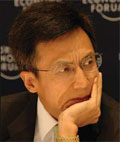| 
The U.S. dollar's status as a reserve currency sowed the seeds for the present worldwide financial crisis. Zhou Xiaochuan, Governor of the People's Bank of China, issued a challenge to America's dominance of the global economy last month when he proposed that a super-sovereign international currency replace the dollar. Xu Xiaonian, Professor of Economics and Finance at the China Europe International Business School, discussed this proposal in a recent article in Caijing magazine. Edited excerpts follow:
The proliferation of the ongoing financial crisis is closely linked to global economic integration. China, a country whose imports and exports account for more than 70 percent of its GDP, has been hit hard by the global financial crisis transmitted through international trade. The plummet in demand for goods by developed countries has a substantial impact on China's economic development.
When getting to the bottom of the factors leading to the U.S. real estate bubble, we find that the Federal Reserve's monetary policy is to be blamed. What is more unacceptable is that the Fed has been printing dollars and increasing the money supply to fight against the crisis, which causes inflation and the depreciation of the dollar. That is to say, the United States has forced all dollar-holding countries to share its financial bailout and fiscal stimulus costs.
America erred, while other countries are going to pay for its mistake. Through the current international monetary system, Americans made it happen.
But the United States is likely to continue issuing dollars so long as the dollar's universal currency position exists. This will lay the groundwork for the next global financial crisis.
Theoretically, the new international monetary system is supposed to limit the risk of any one country issuing excessive amounts of currency and will help prevent the spread of a financial crisis.
Recently, the Chinese Government proposed that a super-sovereign international currency such as the Special Drawing Right (SDR) should gradually replace the U.S. dollar as international reserve currency. This would be the first step to rebuilding the international monetary and financial system.
If China's foreign exchange reserves were overwhelmingly held in SDRs, it would suffer much fewer losses caused by the dollar's depreciation. If all countries' foreign exchange reserves were held in SDRs, it would be impossible for the United States to put the burden of the crisis on the shoulders of other countries.
The U.S. dollar still accounts for the largest proportion of SDRs, or 44 percent. Depending only on SDRs would not completely remove the impact of American monetary policy on the world. But it would be a significant improvement.
When we once again bring up the functions of SDRs, the International Monetary Fund (IMF) should take the demands of emerging markets, including China, into consideration and allocate SDRs to its members in line with their equal rights and obligations. China could seek more quotas and a greater voice in the IMF by providing the organization with more financial support with its foreign exchange reserves.
However, China's currency, the renminbi, is not a fully convertible international currency, so it would not be practical to include it in the SDR's basket of currencies. China should take measures to promote the internationalization of the renminbi. We have noticed that trade volume and GDP are not enough to give us a bigger say in creating regulations for the international economy and finance. We also need to have an internationalized currency. | 